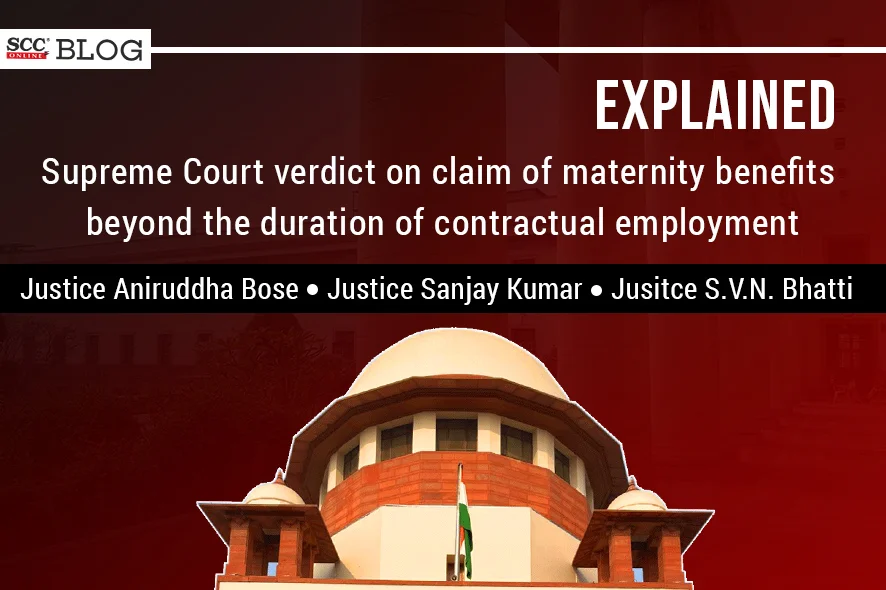Supreme Court: In an appeal by a pathology doctor/ appellant against the judgment and order of the Delhi High Court, wherein the Court upheld the Central Administrative Tribunal’s order rejecting her claim of maternity benefits beyond the duration of her employment, the full bench of Aniruddha Bose, Sanjay Kumar and S.V.N. Bhatti, JJ. while setting aside the impugned judgment and order, directed the employer to extend maternity benefits as would have been available to the appellant in terms of Sections 5 and 8 of the Maternity Benefits Act, 1961 (‘MB Act’) , after deducting therefrom any sum that may already have been paid to the appellant under the same head or for such purpose. Further, it held that maternity benefits could survive or go beyond the duration of employment of the employee.
Background:
The appellant was appointed as Senior Resident in Janakpuri Super Speciality Hospital, an autonomous institute under the Government of NCT of Delhi. Her appointment letter specified that it was purely temporary and as per the residency scheme, such appointment was initially to be for a period of one year, extendable on a yearly basis up to a maximum of three years. Her date of joining was 12-06-2014. Her services were extended twice, for one year period each. Her last extension was for the period of one year from 12-06-2016 to 11-06-2017. On 24-05-2017, she had applied for maternity benefits from 1-06 -2017, in terms of Section 5 of the MB Act. The employer, however, informed her that only 11 days of maternity benefits could be granted since, as per the residency scheme, her tenure came to an end on 11-06-2017 and no further extension was allowed/permissible under the applicable rules.
The appellant challenged the same before the Central Administrative Tribunal, and thereafter in the High Court also, but both rejected her claim on the same reasoning based on which the employer had rejected her claim of maternity benefits for a total of 26 weeks in terms of the MB Act.
Issue: Whether the maternity benefits, as contemplated in the MB Act, would apply to a lady employee appointed on contract if the period for which she claims such benefits overshoots the contractual period?
Analysis:
The Court took note of Section 12(2)(a) MB Act that contemplates entitlement to the benefits even for an employee who is dismissed or discharged at any time during her pregnancy. Thus, the Court said that, continuation of maternity benefits is inbuilt in the statute itself, where the benefits would survive and continue despite the cessation of employment. Further, the Court opined that this legislation envisages entitlement to maternity benefits, which accrues on fulfillment of the conditions specified in Section 5(2) thereof, and such benefits can travel beyond the term of employment also. It is not coterminus with the employment tenure.
After placing reliance on Municipal Corpn. of Delhi v. Female Workers (Muster Roll), (2000) 3 SCC 224 and Deepika Singh v. Central Administrative Tribunal, 2022 SCC OnLine SC 1088 , the Court having regard to Section 27 of the MB Act, which gives overriding effect to the statute on any award, agreement or contract of service, held that the High Court erred in law in holding that the appellant was not entitled to maternity benefits beyond 11-06-2017. Further, it held that the maternity benefits could survive or go beyond the duration of employment of the employee.
Further, the Court after interpreting the relevant provisions of the MB Act, noted that under Section 12(2)(a) there is an embargo on the employer from dismissing or discharging a woman during her pregnancy, who absents herself from work. The expression “discharge” is of wide import, and it would include “discharge on conclusion of the contractual period”. Further, by virtue of the operation of Section 27, the Act overrides any agreement or contract of service found inconsistent with it.
Further, it said that once the appellant had fulfilled the entitlement criteria specified in Section 5(2) of the MB Act, she would be eligible for full maternity benefits even if such benefits exceed the duration of her contract. Any attempt to enforce the contract duration term within such period by the employer would constitute “discharge” and attract the embargo specified in Section 12(2)(a) of the MB Act. The law creates a fiction in such a case by treating her to be in employment for the sole purpose of availing maternity benefits.
[Dr. Kavita Yadav v Ministry of Health and Family Welfare Department, 2023 SCC OnLine SC 1067, decided on 17-08-2023]
Advocates who appeared in this case :
For Appellant(s): Advocate Sourabh Gupta, Advocate Prashant R. Dahat, Advocate Puneet Yadav, Advocate -On-Record T. R. B. Sivakumar
For Respondent(s): Advocate Rachita Garg, Advocate Rajnish Kumar Singh, Advocate Neha Sharma, Advocate Debopriyo Moulik, Advocate -On-Record Deeptakirti Verma






